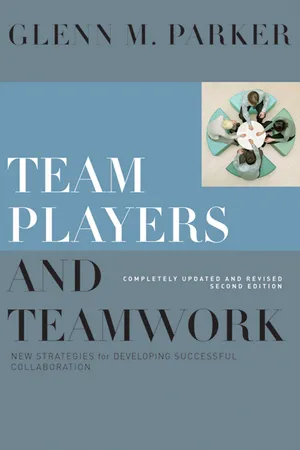Business
Team Player
A team player is someone who collaborates effectively with others, communicates openly, and contributes to the overall success of the team. They are willing to support their colleagues, share knowledge, and work towards common goals. Team players are valued in business for their ability to build strong working relationships, foster a positive work environment, and drive collective achievement.
Written by Perlego with AI-assistance
Related key terms
1 of 5
4 Key excerpts on "Team Player"
- eBook - ePub
Team Players and Teamwork
New Strategies for Developing Successful Collaboration
- Glenn M. Parker(Author)
- 2011(Publication Date)
- Jossey-Bass(Publisher)
3 EFFECTIVE Team PlayerSA Team Player isn’t an isolated example. It’s a way of life that is exhibited in everything they do— including others in decisions, sharing, pitching in, networking, looking for new ways of doing things, etc.—Insurance executive, survey responseBeing a Team Player is a way of life. There are many ways that people in organizations can contribute to the success of a team, but in the past we have had a limited, often one-dimensional view of the Team Player.In sports, the Team Player throws the great block that allows the halfback to score the winning touchdown, makes the beautiful pass that leads to the important basket, or plays while injured in the championship game.In business, the Team Player supports the company program without making waves, does the behind-the-scenes work necessary for the big presentation, or drives through a snowstorm to make a delivery to a customer.We now know that teamwork and being a Team Player are more complex. The project teams at Chrysler who are designing and manufacturing new models, the drug development teams at Merck who are bringing new compounds to market, the research and development teams at Calgon and Coors who are reducing the time it takes to commercialize a new product all require a rich combination of the dimensions of effective teamwork. Although all of the elements are not present in every case, a few characteristics stand out:- Clear goals and a plan to achieve them
- Positive relationships with and support from other parts of the organization
- Excellent communication, openness, and trust among team members
- A blend of people, each contributing a special talent
Teamwork requires Team Players. It sounds like a cliché, but it is a central theme of this work that effective teamwork is based on an effective mix of people who exhibit a variety of styles or approaches to teamwork. In our description of the characteristics of an effective team, we called this style diversity - eBook - ePub
The Mental Strategies of Top Traders
The Psychological Determinants of Trading Success
- Ari Kiev(Author)
- 2009(Publication Date)
- Wiley(Publisher)
Of course, as a good teammate you will be humble and recognize that you do not have all the answers, either, and that everyone can benefit mutually from the input of others. You should also be willing to find alternative views to solving problems. When everyone is contributing to the solution of a problem, there will be a larger frame of reference and a greater ability to move forward faster.CHAPTER IN REVIEW1. While some erroneously consider trading an individual endeavor, in fact the most successful traders are very much Team Players. Team Players understand that working together can contribute to the success of the fund and can also enhance one’s individual success.2. A Team Player is cooperative, interested in helping others, and able to subdue his own ego for the good of the organization. He understands the value of sharing and places greater importance on the good of the group and the benefit of others than on his own selfish interests.3. While some people seem to be born Team Players, it isn’t a skill that has to be inborn. What isn’t inherited can be taught. 4. A Team Player will be responsible, positive and encouraging, competitive, and coachable.5. Individuals may be excellent candidates for a position, but if they don’t complement the existing skills or the management style of the team leader, they are ultimately not going to fit very well. Instead of trying to make a square peg fit into a round hole, look for the round pegs for the round holes and the square pegs for the square holes.6. The key to building good team relationships is communication. Good communication consists of verbal guidance, motivational words, the correct timing of advice, criticism, and encouragement, and the proper mixture of support. It also includes body language and facial gestures and knowing when to stay quiet as well as when to speak.7. To successfully communicate, you must also maintain the confidence of your team members and take into consideration how to best align their emotional interests with the goals of the organization. You have to be clear about requests and commitments and get definition on deliverables and timelines. Make sure that what people hear is what you intended to communicate. - eBook - ePub
Never Drink Coffee During a Business Meeting
Insider Advice From a Top Female CEO
- Liza Marie Garcia(Author)
- 2020(Publication Date)
- Morgan James Publishing(Publisher)
get passionate about. Maybe it’s who she is working with, maybe it’s who the report is for, or maybe it’s simply her goal of leading one day. She will find a way to get passionate about whatever she is working on, and that’s what makes her a great Team Player indeed.• Curiosity. Great Team Players want to know everything about everything. Who are their teammates? What is the coach like? Who are their opponents? What can we do to up our game? Uncovering the answers to these questions drives not only curiosity but also effectiveness, as team members gain proficiency and value for the team with each answer they seek.• Dedication. Great Team Players show up at every practice, sometimes for additional practice, to put in the effort and get the work done. They’re the first one in the office in the morning and the last one to leave at the end of the day.• Effectiveness. You can be friendly, curious, passionate and all the rest but at the end of the day, you need to show results. Get busy or go home applies here.Teams rely on great players to make them run. So do companies. As you progress on your team, keep something in mind: Always respect your team’s leaders, even if your team leader, coach or MVP is slow, plodding, uninformed and ill-equipped to lead, recognize his or her authority and act accordingly. Businesses are hierarchies with a certain pecking order, and if you continually disrupt the natural flow or order by complaining about, undermining or disrespecting your boss, you won’t just be hurting her but the entire organization. What kind of Team Player is that?Being a great Team Player is about knowing your position and how to do it well. The fact is you can’t always be the MVP. No matter how many trophies, awards or commendations you collect. Sometimes you just have to be the one to help lead your team - eBook - ePub
We work Together
Incl. Bonus – Team psychology development leadership motivation & communication, unite differences & opinions successfully, argue discuss solve conflicts, achieve common goals
- Simone Janson(Author)
- 2025(Publication Date)
- Best of HR – Berufebilder.de®(Publisher)
Svenja HofertTeamwork is a term with which everyone connects something else: conflict-free collaboration eg or leadership in the team. And the term has just been heavily worn out by the New Work. 6 tips tell you what's really behind it.Team-capable - definition
In at least every second job advertisement there is the word that nobody understands correctly. "You are able to work in a team" or "we require teamwork". We include formulations such as “you act in a team and service-oriented manner” or “cooperative behavior”.If we ask customers if they are able to work in a team, almost everyone attributes it to them. Even if some colleagues don't like to hear the term and groan at the word “team”. They have often had bad experiences with teamwork. Typical nerve factors are ineffective meetings and meetings where nothing comes out - or just a lazy compromise. If they weren't, (almost) everything would be fine - that's how many see it.Customer view on team ability
If we ask customers what they understand by teamwork, we get very different answers.1. Working harmoniously with others?
Some interpret it as an ability to work harmoniously with others. Signs of good teamwork are for them the lunch together and a feeling of belonging together. Team-able, who respects harmony and communicates well.Team development is above all “doing together”. Subordinating one's own ego seems to be the main task in such a context. In the job, everyone usually has their own tasks.2. Interdisciplinary cooperation
The others interpret teamwork as a competence for interdisciplinary collaboration, in which everyone does their part to the whole. This is about the “I”, that is, the individual, as well as the we, that is, all together.Basically like the football game that you can only win if everyone participates. In which there is a kind of collective consciousness and self-confidence and a common goal - the victory.
Index pages curate the most relevant extracts from our library of academic textbooks. They’ve been created using an in-house natural language model (NLM), each adding context and meaning to key research topics.



